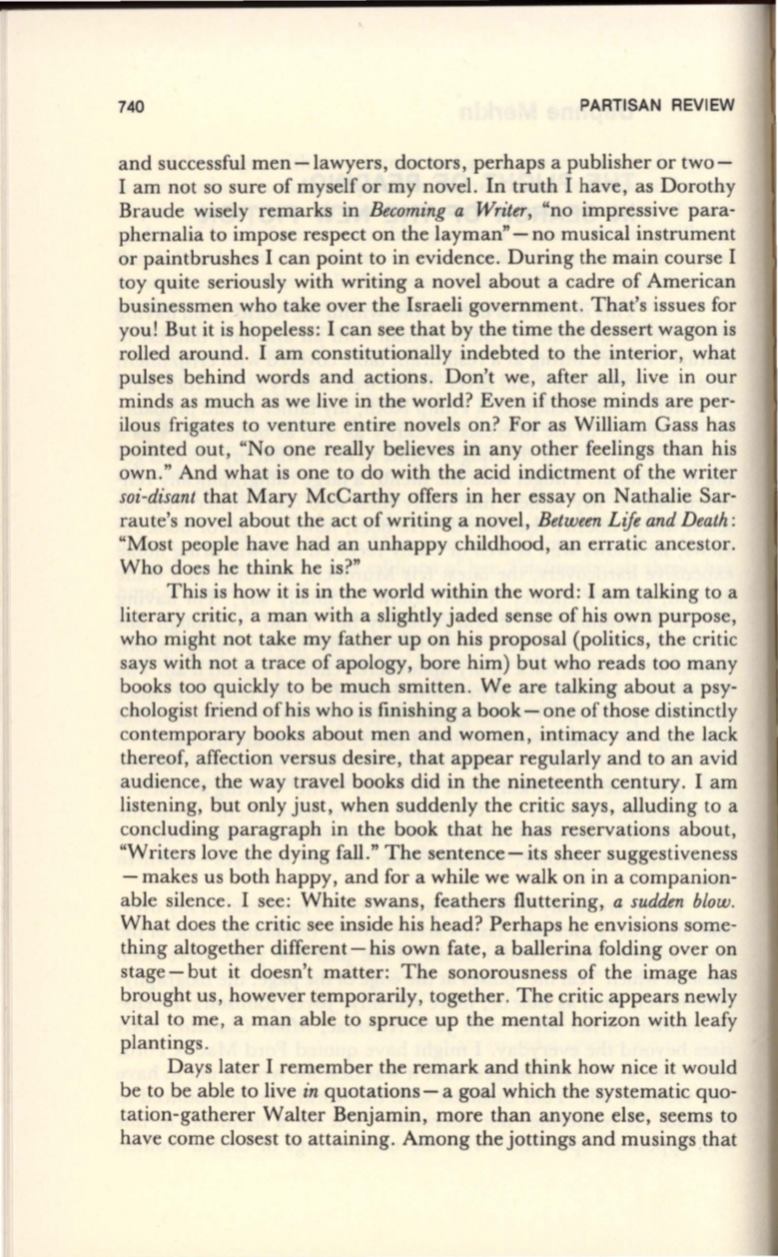
740
PARTISAN REVIEW
and successful men -lawyers, doctors, perhaps a publisher or two–
I am not so sure of myself or my novel. In truth I have, as Dorothy
Braude wisely remarks in
Becoming a Writer,
"no impressive para–
phernalia to impose respect on the layman"- no musical instrument
or paintbrushes I can point to in evidence. During the main course I
toy quite seriously with writing a novel about a cadre of American
businessmen who take over the Israeli government. That's issues for
you! But it is hopeless: I can see that by the time the dessert wagon is
rolled around. I am constitutionally indebted to the interior, what
pulses behind words and actions. Don't we, after all, live in our
minds as much as we live in the world? Even if those minds are per–
ilous frigates to venture entire novels on? For as William Gass has
pointed out, "No one really believes in any other feelings than his
own." And what is one to do with the acid indictment of the writer
soi-disant
that Mary McCarthy offers in her essay on Nathalie Sar–
raute's novel about the act of writing a novel,
Between Life and Death:
"Most people have had an unhappy childhood, an erratic ancestor.
Who does he think he is?"
This is how it is in the world within the word: I am talking to a
literary critic, a man with a slightly jaded sense of his own purpose,
who might not take my father up on his proposal (politics, the critic
says with not a trace of apology, bore him) but who reads too many
books too quickly to be much smitten. We are talking about a psy–
chologist friend of his who is finishing a book- one of those distinctly
contemporary books about men and women, intimacy and the lack
thereof, affection versus desire, that appear regularly and to an avid
audience, the way travel books did in the nineteenth century. I am
listening, but only just, when suddenly the critic says, alluding to a
concluding paragraph in the book that he has reservations about,
"Writers love the dying fall." The sentence- its sheer suggestiveness
-makes us both happy, and for a while we walk on in a companion–
able silence. I see: White swans, feathers fluttering,
a sudden blow.
What does the critic see inside his head? Perhaps he envisions some–
thing altogether different- his own fate, a ballerina folding over on
stage- but it doesn't matter: The sonorousness of the image has
brought us, however temporarily, together. The critic appears newly
vital to me, a man able to spruce up the mental horizon with leafy
plantings.
Days later I remember the remark and think how nice it would
be to be able to live
in
quotations- a goal which the systematic quo–
tation-gatherer Walter Benjamin, more than anyone else, seems to
have come closest to attaining. Among the jottings and musings that


